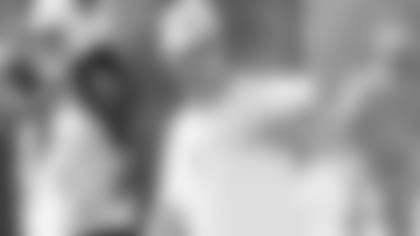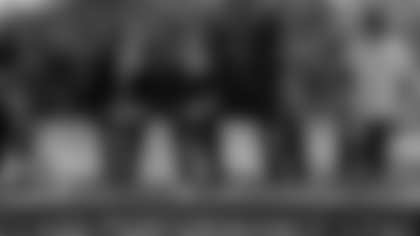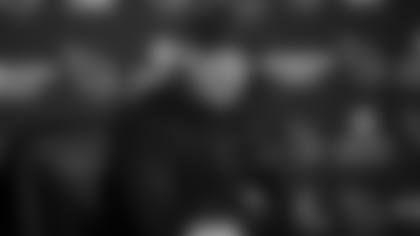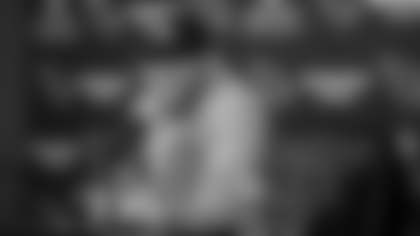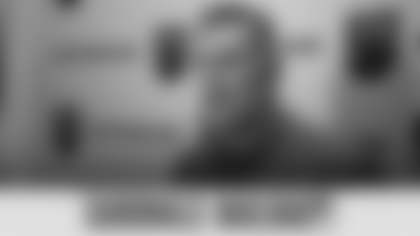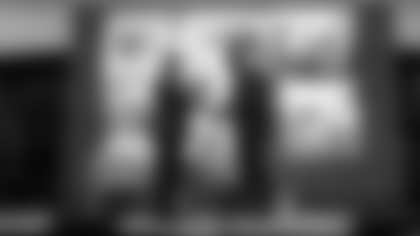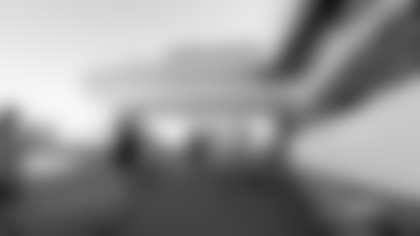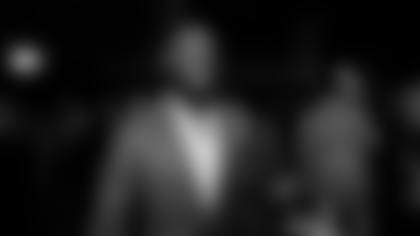Quarterbacks coach Jeff Rutledge directs some players during a Cardinals' practice.
Matthew Schroeder asked:
What indications (other than the digital clock in the end zone) does an NFL QB have that the play clock is about to expire?
"First thing we tell our quarterbacks is when you come out of the huddle find the 40 and 25 second clock. The microphone from the quarterback to the play caller goes off after a certain period of time so there isn't anyone that can warn the quarterback the clock is about to expire. We tell Kurt as soon as you come out of the huddle, make eye contact with the clock."
Darrell asked:
I teach football but haven't been able to find enough good simple concrete "teach the QB to read" drills. Do you have any that you could pass my way?
"I call them spot drills. You get your basic concepts of your pass plays and then you essentially call the play out to them and you say middle field is open or middle field is closed or however you call your quarterback coverage or however you have your quarterbacks read defensive coverages and you just run through those mental drills so they have to react and they can show you they know what they're doing. We'll do spot drills or we'll call a play and then we'll put someone in certain spots and then you tell them middle field is open or middle field is closed then they go to the spot they're supposed to based on what they've been taught."
Russell Luder asked:
Do you ever pinch yourself to make sure you're not dreaming? After all, you are making a living doing what every kid who has ever thrown a backyard touchdown pass dreams of doing!
"Playing is really easier than coaching from a physical standpoint other than getting hit. The hours you spend are a lot more in coaching than playing. Obviously your dream is to be a player but the next best thing once you are done playing is to be a coach and so I've had the best of both worlds. I've been a player and now I'm a coach."
Shirley Johnson asked:
How have do you feel your experiences as a player help you now as a coach?
"You've been there and you've been behind that center. You've been in just about every situation that your quarterback has been in from pressure and seeing the things that you need to see. Although things have changed. There are a lot more things to see now then when I was playing. Defenses are doing a lot more than they used to do and so therefore I'm still in the learning process myself. I always say the best way to learn is to get behind center and now I just learn it mentally. You have to visualize certain things. So much of the quarterback position is mental. If you have the physical tools then what separates the great ones from the average ones is up here (as he points to his head)."
George Millett asked:
I know teams like to establish the run, it has been said a thousand time that you have to run to set up the pass. I don't understand that philosophy when you have the best two receivers in the NFL. I know that we don't run the West Coast Offense, but could we have a few more passes, and then I think the pass could set up the run.
"It's 50-50. A lot of teams will use the run to set up the pass. I will say from being a quarterback myself and from coaching the quarterbacks, if you can run the football it makes the passing game so much easier for the quarterback. If you have to pass to set up the run that is okay too because you've studied and you know what you need to do from a read standpoint and now they're sitting on their heels thinking pass, pass, pass and then you pop your runs, but offensive philosophies differ from team to team."
Rod Badgley asked:
I have always wondered exactly what are the responsibilities of a Quarterbacks Coach?
"Game day I'm on the field looking at coverage. Once we have a play call I'm looking at coverage and from there I know where I'd be going with the ball. The thing with Kurt, he is amazing with what he can see. He'll come back and say well I saw the SAM do this and the backside to that and you get the picture and it is exactly what he said. But I'm there to help read the coverage and make sure he is going to the right place with the ball.
During the week we spend a lot of time watching film. We break film down in certain ways and study it a lot. We're looking at all situations, first, second, third down and red area to try and get a good idea of what your opponent is going to be doing. You're going to get some surprises but that's when they come off the field and you look at the pictures and you can adjustments to what they're doing."
Judy Beatty asked:
Coach Whiz has said that Matt Leinart is looking much improved since last year. Where do you think he is the most improved?
"His footwork is something we've really stressed with him. He has improved in getting a parallel step from center which gets him depth so we're getting him a good parallel first step. We've also worked with him on keeping his front shoulder parallel to down, which is the area where I've seen the biggest improvement. He had the tendency to keep it up which made his angle of release a little behind him and the ball was up a little bit so when it is parallel he drive the ball and he is using his legs so much more with that."
Tom Watts asked:
What is it like being in the NFL and what's the biggest different in coaching at this level compared to college and high school?
"The ability is the biggest thing. I've said it as a player, the speed of the game when I played from high school to college went up and from college to the pros it goes up even more. It's no different as a coach. I've coached on every level and every the speed, the size and what they can do is definitely different."
Sam Rogers asked:
What is the biggest difference in Kurt Warner compared to Matt Leinart?
"Experience I think is the number one thing. The more snaps you have behind center the better off you are and there won't be a whole lot of surprises you can get if you've been behind center a bunch, which is a big deal and that comes with play time. Matt just hasn't had the play time that Kurt has but Matt has a great future ahead of him and he is just taking advantage of watching Kurt and learning from Kurt. Kurt is the smartest player I've ever been around, no question."
John MacDonald asked:
A guy that kind of gets lost in the shuffle of all of the quarterbacks talk is Brian St. Pierre. How has he looked?
"I tell you what, he is very impressive. He came from Pittsburgh so you know he knew the offense and he is a very smart guy. He is very eager to learn and we've been working a lot with his fundamentals and he'll listen to everything you tell him and do his best to repeat it on the next play."
Tom Edwards asked:
I am a high school history teacher and coach football, I would like to make it to the next level(college), what advice can you give me?
"I would say more than anything I would say take advantage of where you are now and use the opportunity to have an impact on the kids. I've coached at all levels and enjoyed them all but what I've found is that at the high school level you can have the biggest impact because of their age. Just keep plugging away and go with any leads you have and take advantage of the people you know and don't be afraid to pick up the phone and call somebody."
Walter H. Richters asked:
I would like to know what you think the difficulties are for the receivers and tailbacks concerning Warner being right handed and Leinart being left handed.
"No, I've asked that question being a righty myself but the ball does take a different spin but it's just a matter of getting comfortable with both of them."
Jeff Gollin asked:
Are ball handling skills mainly "inherent" or can they be learned at the pro level?
"I think they can be learned. Ball handling is something I think you take for granted We were watching film the other day and this particular quarterback tossed the ball before he even hit the fullback. What we've done this year is if you watch our practices the first thing Kurt does when we come out of warm ups is go to ball handling. That is something that if you don't work on much can turn a game around in a negative way just as fast as anything. You have to come out from under center, bring the ball to your stomach and all of the little things. You have to take care of it. It's proper footwork and it's different depending on whether or not a fullback is there.
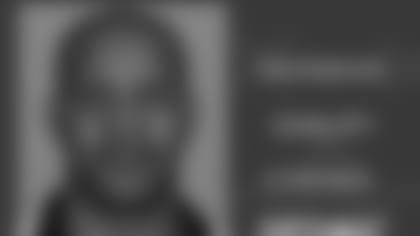
To ask a question of Dedric Ward, click here or send an e-mail to askquestions@cardinals.nfl.net.
Contact Darren Urban at askdarren@cardinals.nfl.net. Posted 10/17/08.


